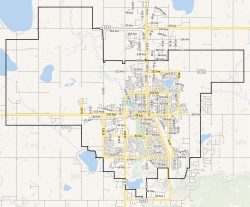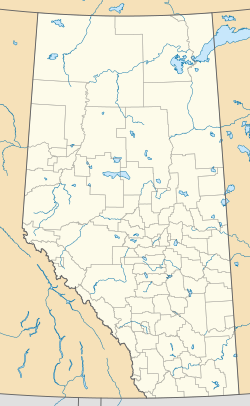Grande Prairie | |
|---|---|
| City of Grande Prairie | |
 Skyline of Grande Prairie viewed from the northeast | |
| Nickname: Swan City[1] | |
 City boundaries | |
| Coordinates: 55°10′15″N 118°47′46″W / 55.17083°N 118.79611°W[2] | |
| Country | Canada |
| Province | Alberta |
| Region | Northern Alberta |
| Planning region | Upper Peace |
| Municipal district | County of Grande Prairie No. 1 |
| Federal electoral district | Grande Prairie-Mackenzie |
| Provincial electoral districts | Grande Prairie Grande Prairie-Wapiti |
| Incorporated[3] | |
| • Village | April 30, 1914 |
| • Town | March 15, 1919 |
| • City | January 1, 1958 |
| Government | |
| • Mayor | Jackie Clayton |
| • Governing body |
|
| • City Manager | Robert Nicolay (Interim) |
| • MP | Chris Warkentin (Conservative) |
| • MLA | Nolan Dyck (UCP) Ron Wiebe (UCP) |
| Area (2021)[5] | |
| • Land | 132.71 km2 (51.24 sq mi) |
| Elevation | 650 m (2,130 ft) |
| Population (2021)[5] | |
• Total | 64,141 |
| • Density | 483.3/km2 (1,252/sq mi) |
| • Municipal census (2018) | 69,088 |
| • Estimate (2020) | 69,355[7] |
| Time zone | UTC−07:00 (MST) |
| • Summer (DST) | UTC−06:00 (MDT) |
| Forward sortation areas | |
| Area code(s) | 780, 587, 825, 368 |
| Highways | 40, 43, 43X |
| Waterways | Wapiti River Bear River (Bear Creek) |
| Website | cityofgp |
Grande Prairie is a city in northwestern Alberta, Canada, within the southern portion of an area known as Peace River Country. It is located at the intersection of Highway 43 (part of the CANAMEX Corridor) and Highway 40 (the Bighorn Highway), approximately 456 km (283 mi) northwest of Edmonton. The city is surrounded by the County of Grande Prairie No. 1.
Grande Prairie was the seventh-largest city in Alberta in 2016, with a population of 63,166,[8] and was one of Canada's fastest growing cities between 2001 and 2006,[9] and Canada's northernmost city with more than 50,000 people.
The city has adopted the trumpeter swan as its official symbol due to its proximity to the bird's migration route and its summer nesting grounds. For that reason, Grande Prairie is sometimes nicknamed the "Swan City". The dinosaur has also emerged as an unofficial symbol of the city due to paleontology discoveries in the areas north and west of Grande Prairie.
- ^ "History of Grande Prairie". City of Grande Prairie. Archived from the original on April 28, 2012. Retrieved June 9, 2012.
- ^ "Grande Prairie". Geographical Names Data Base. Natural Resources Canada.
- ^ "Location and History Profile: City of Grande Prairie" (PDF). Alberta Municipal Affairs. June 17, 2016. p. 57. Retrieved June 18, 2016.
- ^ "Municipal Officials Search". Alberta Municipal Affairs. May 9, 2019. Retrieved October 1, 2021.
- ^ a b Cite error: The named reference
2021censuswas invoked but never defined (see the help page). - ^ "Alberta Private Sewage Systems 2009 Standard of Practice Handbook: Appendix A.3 Alberta Design Data (A.3.A. Alberta Climate Design Data by Town)" (PDF) (PDF). Safety Codes Council. January 2012. pp. 212–215 (PDF pages 226–229). Archived from the original (PDF) on October 16, 2013. Retrieved October 8, 2013.
- ^ "Census Subdivision (Municipal) Population Estimates, July 1, 2016 to 2020, Alberta". Alberta Municipal Affairs. March 23, 2021. Retrieved October 8, 2021.
- ^ Cite error: The named reference
2016censusABmuniswas invoked but never defined (see the help page). - ^ "Population and dwelling counts, for Canada and census subdivisions (municipalities) with 5,000-plus population, 2006 and 2001 censuses - 100% data". Statistics Canada. January 6, 2010. Archived from the original on December 15, 2014. Retrieved October 28, 2012.



